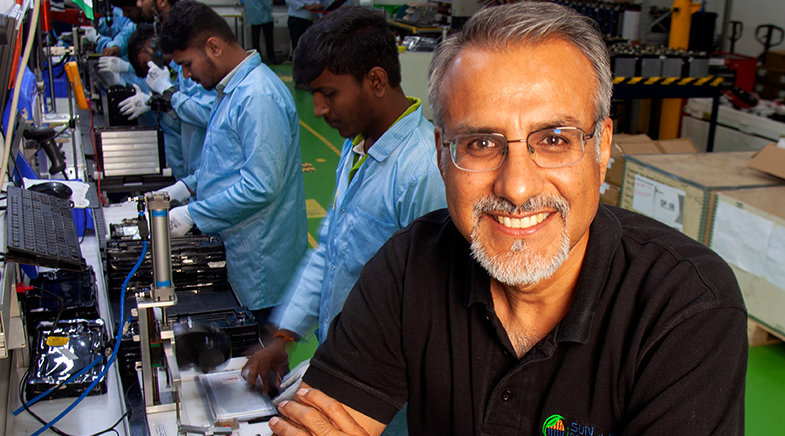On the road to e-mobility
-
- from Shaastra :: vol 01 issue 05 :: Sep - Oct 2022

Several catalytic factors – from a government nudge to advances in technology to a widening market – are driving a greater embrace of e-vehicles in India.
All day long, a steady stream of two-wheelers, and the occasional three-wheeler autos and four-wheeled light commercial vehicles, roll in through the gates of an otherwise-nondescript two-storeyed building in Doddanekundi Industrial Area in Bengaluru. What distinguishes them is that they are all electric vehicles (EVs), part of a gradually growing fleet on Indian roads, and they're here for the automobile equivalent of a 'heart transplant': a battery-swap procedure that, in its clinical efficiency, resembles nothing so much as a Formula 1 pit stop operation.
The driver retrieves the used battery from his vehicle and takes it to the swapping station. A flash of an RFID-embedded smart card opens up an empty pigeonhole into which he deposits the battery. The residual battery power is quickly gauged, and the driver gets a fully charged battery – which he loads into his vehicle. In just minutes, he's good to go.
The turnaround time for a battery swap is under two minutes, "much less time than it takes to fill petrol at a fuelling station," says Chetan Maini, Chairman and Co-founder of Sun Mobility, who is spearheading a battery innovation to make electric mobility affordable in India.
The battery-swap facility was set up by Sun Mobility, a joint venture between Virya Mobility 5.0 and Sun New Energy Systems (part of the U.K.-based Sun Group). It offers a solution to what Maini considers the three core concerns that EV users face: high battery cost; worries over mileage; and the long battery-charging time.
Maini speaks with authority and passion on the subject: more than two decades ago, he gave India its first mass-manufactured electric car Reva. After heading the greenfield project for 15 years before it was sold to Mahindra & Mahindra, Maini began scouting for ideas to make the fledgling EV industry tick.
"There is a big shift happening globally," he points out. Today, EVs account for 70% of all cars sold in Norway. Electric car-maker Tesla sells more EVs than the number of petrol cars sold by major automakers. That trend is manifesting itself in India, too: for two recent months, 50% of three-wheelers sold in India were electric. Electric two-wheeler sales have risen more than six-fold over the past year.
And conditions in India are just right for the domestic EV industry to catch up with the global market, Maini reckons. With government support, and the advent of new business models (such as battery swapping), EV products will become cheaper than fossil fuel-powered vehicles, he reasons. Changing consumer mindsets, too, are expanding the market.
PAST ISSUES - Free to Read


Have a
story idea?
Tell us.
Do you have a recent research paper or an idea for a science/technology-themed article that you'd like to tell us about?
GET IN TOUCH














